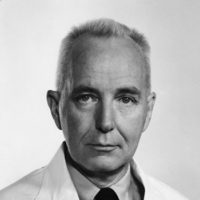
Charles Huggins
University of Chicago
For discoveries concerning the role of the endocrine system in the pathogenesis and treatment of certain cancers, such as cancer of the prostate.
Dr. Charles Huggins’s career exemplifies the highest achievement in the application of biological science to human welfare. An inspired and persevering investigator, he has exhibited remarkable insight into basic problems, and an extraordinary versatility in turning from the laboratory to the clinic and, finally, to the operating room. His intensive studies of prostate function in animals constitute a classic chapter in the history of medicine.
Before 1940 he was responsible for the first demonstration of competitive inhibition of male sex hormone action by female sex hormone. His observations on dogs led him, in 1940, to initiate the use of the female sex hormone in the treatment of cancer of the prostate in man. With this treatment, about 95 percent of men with cancer of the prostate derive benefit, varying in duration from 6 months to 20 years, after evidence of metastases has been demonstrated. Recent studies have shown that in men with cancer of the prostate, without evidence of metastases treated by either castration or female hormone administration, survivals of 5 years or more were obtained in 44 percent of cases, compared with 5 year survivals in only 10 percent of patients not so treated. This discovery was the first proof that a hormone—a medicine or chemical taken by mouth—could affect any form of cancer in man even for a short period of time, and inspired the active search for hormone and hormone-related chemicals for the control of other forms of cancer.
In 1951, these endocrine studies led Dr. Huggins to demonstrate the beneficial effects of removal of both adrenal glands in women with far advanced breast cancer which had spread to other parts of the body. In his hands, 40 percent of such patients have had temporary benefit from this operation, with increase in survival from 18 months to 10 years.
Dr. Huggins has in recent years turned his attention to the control of growth of breast cancer by steroidal substances. Almost all of the new tumor growth-controlling steroids now used were first revealed by Dr. Huggins in animal tests.
Besides acting as the imagination and catalyst to modern endocrine studies and tumor control in animals and men, he has established, in the Ben May Laboratory, a world-renowned center for research from which have emerged important discoveries in fundamental biology and a steady stream of brilliant young biochemists. Dr. Huggins is in spirit young, in humanity generous, and in achievement magnificent.
